#masnavi
Text
"Attar is one of the greatest poets of the Persian language. Nonetheless, his popularity - both in Iran itself and in the West (Goethe, for example, touched on him only briefly in his West-Eastern Divan) - does not match that of Ferdowsi (d. 1020), Omar Khayyam (d. c.1132), Rumi, Saadi (d. 1292) or Hafiz (d. 1389); occasionally he is even omitted from the line of seven Persian poet-princes in favour of Jami (d. 1492). One possible reason for this is that the composition of his poetry is too artful, too complex to be effective in the town squares and teahouses, while at the same time, many of his stories and figures may seem too coarse, too folk-like and too sarcastic to be at the forefront of the high spiritual literature cultivated at courts in former times and in middle-class households today. Attar’s poetry, on the other hand, is far less stilted than that of most Persian poets but, rather, unadorned, clear and immediate. The pain it expresses is not spiritually filtered as in Rumi, far less metaphysically elevated than in Saadi, and not sublimated into pleasure as in Omar Khayyam - where Hafiz turns the earthly into the mystical, Attar strips mysticism down to its leaden, earthly foundation in order to scream his longing to the heavens."
--Navid Kermani, The Terror of God: Attar, Job and the Metaphysical Revolt
.
I asked my professor which masnavi (Persian epic poem) he thinks is the greatest ever written. He replied, Rumi's Masnavi (the only masnavi Rumi wrote). Shock. How can there be a masnavi greater than Attar's Conference of the Birds? (There are 4 authentic Attar masnavis; sadly, as far as I know, Conference of the Birds is the only one that has been translated into English.) Reading through Rumi's masnavi I think I am still team Attar. It's Attar's coarseness I love--he is a poet of mad saints and freaks. In Rumi's Masnavi, the absence of a frame story and the pious/didactic tone is somewhat of a barrier for me. The pieces don't quite hang together, whereas Attar's Conference of the Birds is intricately structured--there are stories within stories within stories, each bird with its idiosyncratic psychology--a narrative arc that mirrors the journey of the soul across the seven valleys. But maybe there is a difference between reading a sufi text for its poetry rather than religious instruction, I don't know.
#attar#Rumi#persian poetry#poetry#literature#masnavi#Navid Kermani#islam#islamic mysticism#islamic literature#mysticism#sufism#sufi literature
181 notes
·
View notes
Text

Poem in text form under the cut
Perfect Illusions
Masnavi poem
I see the ace up your sleeve, tucked in torn lace
The filth in the room masked by pricey perfume
A wilted corsage, still perfectly tilted
On a lapel that might as well be a cell.
Anaesthetic masking words made synthetic
By luxuriant schemes hiding broken dreams
Gold-plated jewels and pupils dilated
To bosh garble among columns of marble
Hiding the grime under facades of sublime.
#writing#creative writing#poem#poetry#original poem#poems on tumblr#napowrimo#poetryblr#sad poem#poems and poetry#words words words#poetic#materialism#consumer culture#consumerism#consumer behavior#female writers#writerscommunity#writeblr#writers on tumblr#writers and poets#writers#women writers#short poetry#poems#spilled ink#original poetry#poet#masnavi
11 notes
·
View notes
Text
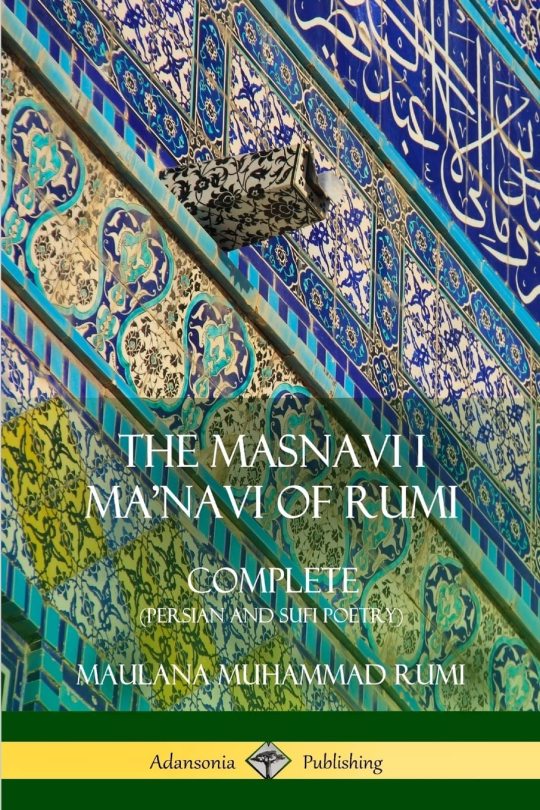
14 notes
·
View notes
Text
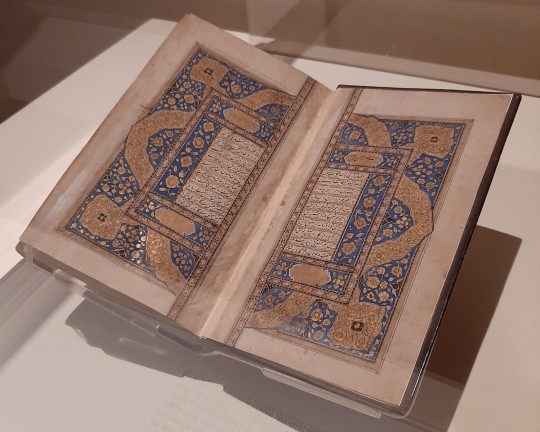
Spiritual Couplets (Masnavi) by Maulana Jalal al-Din Rumi
Kashmir, 24th December 1827
The sweet lyrics of Rumi are among the gems of world literature, and his Masnavi is one of the most well-known works of Islamic Sufism. This copy's small nasta'liq script, arranged in ornate horizontal and vertical verses and ornamented with vibrant blue and gold, was written by the scribe Ahmadallah, also called Hakim Masih al-Zaman, who was also the author of a medical treatise (Khulasat al-tibb).
#masnavi#rumi#kashmir#19th century#mine#aga khan museum#Islam#religion#sufi#nasta'liq#Ahmadallah#hakim masih al zaman#khulasat al tibb#history
40 notes
·
View notes
Text
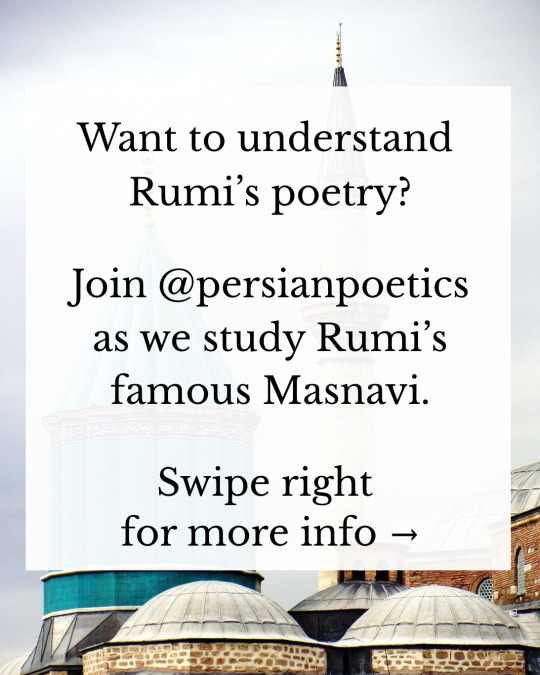
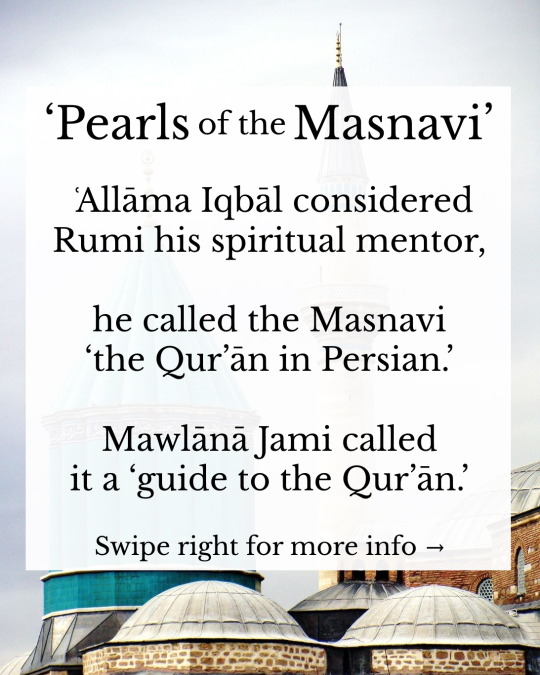

This starts soon! Classes are online and recorded. No Persian required. https://persianpoetics.com/rumi
5 notes
·
View notes
Text
Laila and the Khalifa.
The Khalifa said to Laila, "Art thou really she
For whom Majnun lost his head and went distracted?
Thou art not fairer than many other fair ones." She replied, "Be silent; thou art not Majnun!"
If thou hadst Majnun's eyes,
The two worlds would be within thy view.
Thou art in thy senses, but Majnun is beside himself. In love to be wide awake is treason.
The more a man is awake, the more he sleeps (to love);
0 notes
Text
“If Ahmad (saww) should display that glorious pinion (his spiritual nature),
Gabriel (as) would remain dumbfounded unto everlasting”.
• Jalaludin Rumi
0 notes
Text
i stumbled across a Rumi quatrain on tumblr today and it reminded me to go looking for my favourites, so here's a few, all taken from Kulliyat-e Shams-e Tabrizi, with the caveat that i do not speak Farsi and I have read them all as translations only. more notes on translation at the end, but all of these are translated by Zara Houshmand, and taken from the archives of The Iranian.
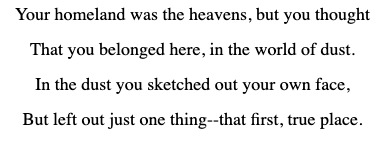
#1771

#57
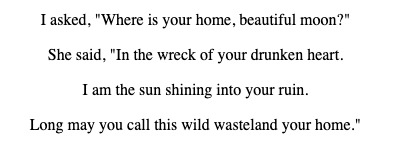
#1584

#1316
and the note on translation: these are of course not the Coleman Barks translations, the most popular English translations. i think the orientalism and... de-Sufi-fying and de-Muslim-ifying of the Barks translations and a lot of English-language and Western perception of Rumi is much more discussed now (Jawid Mojaddedi, who is writing a translation of Rumi's multi-volume Masnavi, says, "The Rumi that people love is very beautiful in English, and the price you pay is to cut the culture and religion.") if you're interested, Persian Poetics has a great twitter thread about it and their website has text, audio, and video resources where they've talked about it. and this article from Ajam Media is a short read and an interesting comparison of a few different translations.
if you enjoy Zara Houshmand's translations, she has a book of translations of Rumi's quatrains, Moon and Sun. there's many translations of Rumi's works not by Barks, that prioritise different things: you can 100% find a translation that isn't Barks, and Rumi's work is. so beautiful and so much better when you are not reading whatever uhhh... interpretation Barks came up with.
#image description in alt#poetry#text post#my post#fun fact in the same article i linked barks is quoted as saying#'the Qur'an is hard to read'#(yes i have changed the transliteration to Qur'an from the quote bc i'm sorry but i refuse to type it that way)#1 that's fucking bonkers to say as someone who has 'translated' Rumi's work like how are you openly admitting to that#and 2 the Masnavi quotes extensively from the Qur'an???#anyway i cannot begin to describe the shock i felt when i first came across 1 Rumi quatrains in the original Farsi where you can. physicall#see how much is missing from Barks' translation (and can identify common themes in those words if you can read any Arabic script)#and 2 when i read other translations for the first time and realised how much both God-as-figure and Islamic and Sufi tradition and#philosophy was missing#i was genuinely upset#it's... idk#when you are feeling that strange and deep ache and joy of love that is always mixed with the deep ache and joy of faith or God or etc#you gotta turn to Rumi yknow i need to remember that more often#i also haven't quoted from Mojaddedi's translation bc#i have honestly only seen bits and pieces of the Masnavi#if there's someone who has read more of it or can weigh in on the translation lmk#but like maybe one of my projects next year needs to be trying to read the first volume of that translation
4 notes
·
View notes
Text

May divine love, that mysterious alchemical power that springs from the deepest, eternal heart of reality, turn all thorns into roses as Rumi writes...
Through love bitter things seem sweet,
Through love bits of copper are made gold.
Through love dregs taste like pure wine,
Through love pains are as healing balms.
Through love thorns become roses,
And through love vinegar becomes sweet wine.
— Rumi, Masnavi-ye-Ma'navi
1 note
·
View note
Text
From "The Ocean of Nonexistence" by Mohammed Rustom

Rumi, it will be recalled, defined love as the Ocean of Life. This is from the perspective of God. Yet from the perspective of humans, it is more fitting to call love the ‘Ocean of Nonexistence’ (darya-yi 'adam). Hence, Rumi says:
What then is love? The Ocean of Nonexistence.
It is there that the foot of the intellect is broken.
...the first hemistich is not as clear: if love is the Ocean of Nonexistence, then why bother with it? That is, what does it mean to call love the Ocean of Nonexistence, and why should human beings devote themselves to something that ‘is not’? As a provisional answer, and one that will become clearer in due course, it can be noted that Rumi is not trying to say that love is nonexistent in reality, or that love is somehow that which leads to nonexistence. Rather, love is the Ocean of Nonexistence on the human side of the equation. After having delved into the Ocean of Love, which is the root of existence for Rumi – since it is nothing other than God, the Living Lover – one’s own qualities, self-perception, and ‘ego’ cease to ‘be’. That is, the ego, overtaken by the tidal waves of love, becomes completely annihilated in the face of love’s waters, and thus comes to be nonexistent. What subsists is not the individual ego, but the soul transformed by the power of love so that it can dwell in the sacred presence of God, not as an individual ‘I’ that is separate from God, but an ‘I’ that is wholly indistinguishable from the Ocean. In other words, once the individual waves of the Ocean ebb back into the Ocean, they lose their individual properties and return to their true source, which is the Ocean. It is at this moment that all traces of duality disappear, and it is from this perspective that such Qur’anic verses as VIII: 17 are to be understood.
With respect to the intellect, Rumi distinguishes in his writings between two types. The first type of intellect, which is called the ‘partial intellect’ ('aql-i juzwi), is unsound and unhealthy. It can only see duality, otherness, separation and multiplicity; in short, it insists on the separate existence of the waves in the Ocean. It is the foot of this intellect that ‘breaks’ when it dips itself into the Ocean of Nonexistence. In contrast to the partial intellect is an intellect that is sound and healthy, and that is spiritually fit to discern the nature of reality. It can see unity, oneness and truth; in short, it can see the Ocean and does not insist on the separate existence of its waves. In keeping with the Persian Sufi tradition that preceded him, Rumi calls this type of intellect the ‘Universal Intellect’ ('aql-i kulli).
#oceanic feeling#water#poetry#Persian poetry#sufism#sufi poetry#rumi#Mohammed Rustom#masnavi#mysticism#islamic mysticism#theology#islamic literature#fana#waters of oblivion
28 notes
·
View notes
Photo

Greenfield Capital Explains Why Lisbon Is One of the Most Important Crypto Hubs
In a compelling new research report by Greenfield Capital, a European firm specializing in crypto investments, a comprehensive exploration of the current state of the crypto landscape in Europe has been presented. According to Greenfield’s blog post, “State of European Crypto Report,” was conducted with a unique approach that involved analytical assessments and the perspectives […]
https://www.cryptoglobe.com/latest/2023/05/greenfield-capital-explains-why-lisbon-is-one-of-the-most-important-crypto-hubs/
0 notes
Text
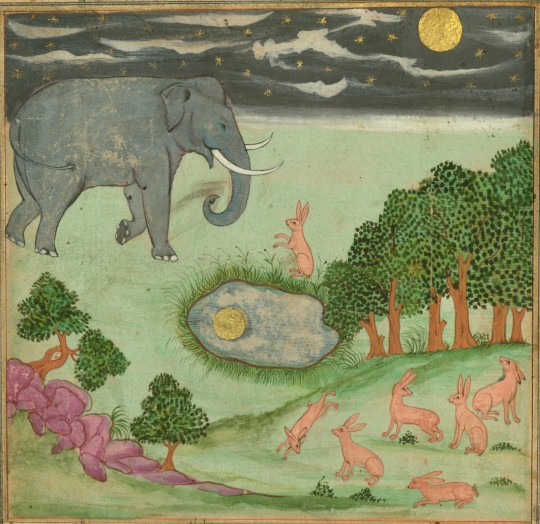
Mas̱navī-i maʿnavī, Illuminated Manuscript, Collection of poems (masnavi), The king of the elephants, Walters Art Museum Ms.
This is an illustrated and illuminated copy of the collection of poems, known as Mas̱navī-i maʿnavī, of Jalāl al-Dīn Rūmī (d. 672 AH / 1273 CE). According to the colophon (fol. 314b), the text, written in black nastaʿlīq script, was completed in India in 1073 AH / 1663 CE. Each section of the work is introduced by a double-page illuminated incipit containing a preface in prose, followed by two illustrations and an illuminated incipit page for the masnavi. In total, fifty paintings illustrate the text.
270 notes
·
View notes
Text
How blessed are these sacred dawn hours
How lovely to take to heart:
the One we seek
sought us first.
— Rūmi
[Masnavi 3:411]
78 notes
·
View notes
Text
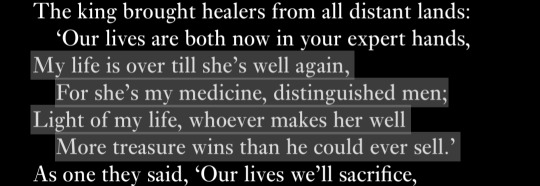
- The Masnavi; Book One (Rumi)
#poem#poetry#literature#art#love#heartache#quotes#book quotes#there used to be so much love#the past#past lives#rumi
21 notes
·
View notes
